Football League
In January, 1884, Preston North End played the London side, Upton Park, in the FA Cup. After the game Upton Park complained to the Football Association that Preston was a professional, rather than an amateur team. Major William Sudell, the secretary/manager of Preston North End admitted that his players were being paid but argued that this was common practice and did not breach regulations. However, the FA disagreed and expelled them from the competition.
Sudell had improved the quality of the team by importing top players from other areas. This included several players from Scotland. As well as paying them money for playing for the team, Sudell also found them highly paid work in Preston.
Preston North End now joined forces with other clubs who were paying their players, such as Bolton Wanderers, Aston Villa and Sunderland. In October, 1884, these clubs threatened to form a break-away British Football Association. The Football Association responded by establishing a sub-committee, which included William Sudell, to look into this issue. On 20th July, 1885, the FA announced that it was "in the interests of Association Football, to legalise the employment of professional football players, but only under certain restrictions". Clubs were allowed to pay players provided that they had either been born or had lived for two years within a six-mile radius of the ground.
The decision to pay players increased club's wage bills. It was therefore necessary to arrange more matches that could be played in front of large crowds. On 2nd March, 1888, William McGregorcirculated a letter to Aston Villa, Blackburn Rovers, Bolton Wanderers, Preston North End, and West Bromwich Albion suggesting that "ten or twelve of the most prominent clubs in England combine to arrange home and away fixtures each season."
John J. Bentley of Bolton Wanderers and Tom Mitchell of Blackburn Rovers responded very positively to the suggestion. They suggested that other clubs should be invited to the meeting being held on 23rd March, 1888. This included Accrington, Burnley, Derby County, Notts County, Stoke, Wolverhampton Wanderers, Old Carthusians, and Everton should be invited to the meeting.
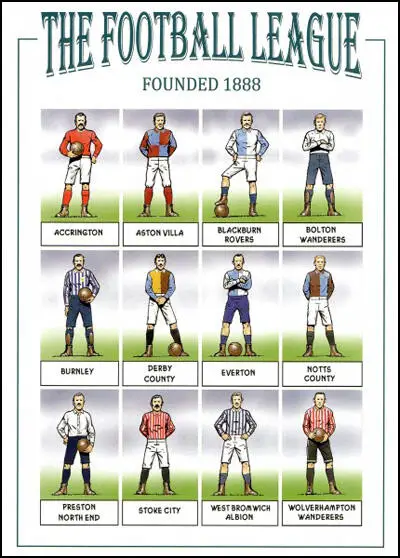
The following month the Football League was formed. It consisted of six clubs from Lancashire (Preston North End, Accrington, Blackburn Rovers, Burnley, Bolton Wanderers and Everton) and six from the Midlands (Aston Villa, Derby County, Notts County, Stoke, West Bromwich Albion and Wolverhampton Wanderers). The main reason Sunderland was excluded was because the other clubs in the league objected to the costs of travelling to the North-East. McGregor also wanted to restrict the league to twelve clubs. Therefore, the applications of Sheffield Wednesday, Nottingham Forest, Darwen and Bootle were rejected.
The first season of the Football League began in September, 1888. Preston North End won the first championship without losing a single match and acquired the name the "invincibles". Major William Sudell, had persuaded some of the best players in England, Scotland and Wales to join Preston: John Goodall, Jimmy Ross, David Russell, John Gordon, John Graham, Robert Mills-Roberts, James Trainer, Samuel Thompson and George Drummond. He also recruited some outstanding local players, including Bob Holmes, Robert Howarth and Fred Dewhurst. As well as paying them money for playing for the team, Sudell also found them highly paid work in Preston.
Eighteen wins and four draws gave them a 11 point lead at the top of the table. The top goal scorers were John Goodall (21), Jimmy Ross (18), Fred Dewhurst (12) and John Gordon (10). Preston North End also beat Wolverhampton Wanderers 3-0 to win the 1889 FA Cup Final. Preston won the competition without conceding a single goal.
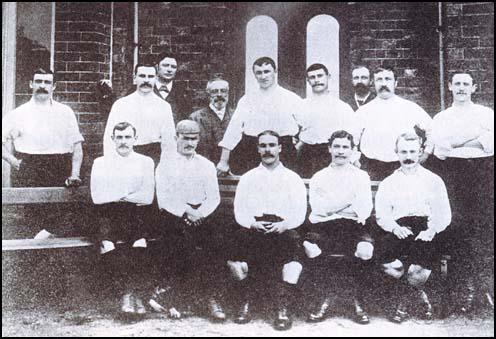
Bob Holmes, Robert Howarth, William Sudell, John Graham and Robert Mills-Roberts are in the
back row. John Gordon, Jimmy Ross, John Goodall, Fred Dewhurst and Samuel Thompson
are sitting on the bench.
Preston North End also won the league the following season. This time it was much closer as they only beat Everton by one point. James Trainer, John Gordon and David Russell appeared in all 22 league games and Jimmy Ross and George Drummond only missed one game.
It was the last time that Preston was to win the Football League. They finished second to Everton (1890-91) and Sunderland (1892-93) but after that they ceased to become a major force in the game. Preston's top players were persuaded to sign for other clubs: John Goodall (Derby County), Jimmy Ross (Liverpool), Nick Ross (Everton), David Russell (Nottingham Forest), Samuel Thompson (Wolverhampton Wanderers), whereas Bob Holmes, George Drummond, Robert Mills-Roberts, James Trainer and John Graham retired from full-time professional football.
The club also won the league the following season. However, other teams began to employ the same tactics as Major William Sudell. Clubs like Derby County, Everton, Sunderland, Aston Villa, and Wolverhampton Wanderers had more money at their disposal and could pay higher wages than Preston. Over the next couple of years Preston lost all their best players and they were never able to win the league title again.
Sunderland won the Football League championship in the 1891-92 season and reached the semi-final of the FA Cup. William McGregor described Sunderland as having a "talented man in every position" and as a result they acquired the name the "Team of All Talents".
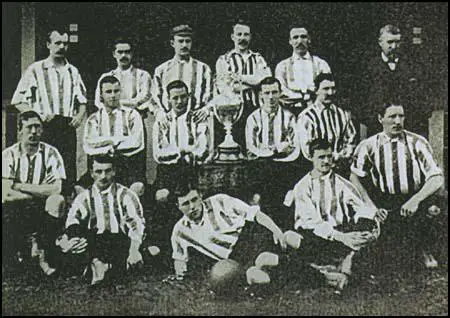
Sunderland retained the championship in 1892-93 and were runners-up to Aston Villa in the 1893-94 season. Sunderland were also champions in 1894-95. Ted Doig did not miss a Football League or FA Cup game between 20th September 1890 and 9th September 1895.
Aston Villa was probably the best club in England during the 1890s when it won the First Division championship five times in seven years: 1893-94, 1895-96, 1896-97, 1898-99 and 1899-1900. During this period they had also won the FA Cup twice (1895 and 1897). Stars of the team during this period included John Devey, Charlie Athersmith, Howard Spencer, James Cowan, Dennis Hodgetts, Willie Groves, Jimmy Crabtree, Johnny Campbell, Alex Leake, George Tranter, Jack Reynolds, Billy Garraty, George Wheldon, Stephen Smith, George Johnson, Robert Chatt, John Cowan and Stephen Smith.
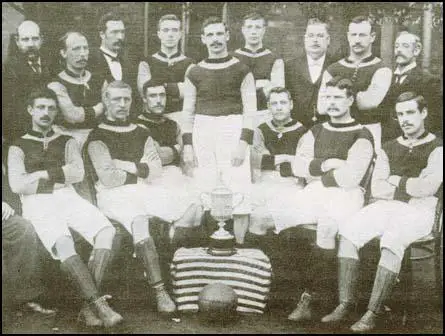
Howard Spencer, John Devey, Albert Wilkes, James Welford; front row, Charlie Athersmith,
Robert Chatt, James Cowan, George Russell, Dennis Hodgetts and Stephen Smith.
Aston Villa was probably the best club in England during the 1890s when it won the First Division championship five times in seven years: 1893-94, 1895-96, 1896-97, 1898-99 and 1899-1900. During this period they had also won the FA Cup twice (1895 and 1897). Stars of the team during this period included John Devey, Charlie Athersmith, Howard Spencer, James Cowan, Dennis Hodgetts, Willie Groves, Jimmy Crabtree, Johnny Campbell, Alex Leake, George Tranter, Jack Reynolds, Billy Garraty, George Wheldon, Stephen Smith, George Johnson, Robert Chatt, John Cowan and Stephen Smith.
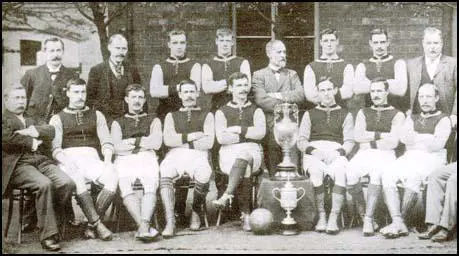
John Grierson (trainer), Howard Spencer, James Whitehouse, Joshua Margoschis (chairman),
William Evans, Jimmy Crabtree, John Lees (director). Seated, from left to right,
Victor Jones (director), James Cowan, Charlie Athersmith, Johnny Campbell, John Devey,
George Wheldon, John Cowan and Jack Reynolds.
Professional football was slow to develop in southern England. In 1891 Arsenal became the first London side to turn professional. Arsenal attempted to establish a Southern League and when that failed, they joined Second Division of the Football League in 1893. By this time the Football League had 31 members. This was increased to 36 in 1898-99.
In 1894 Millwall played a leading role in the creation of a Southern League. Other founder members included Reading, Luton Town, Swindon Town, Chatlam, Clapton and Ilford. Millwall won the league for the first two years of its existence.
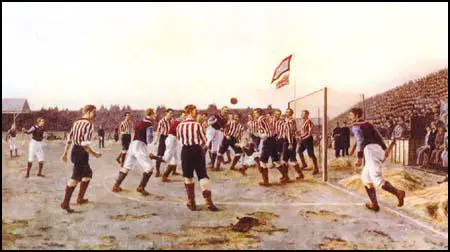
By the 1900-1901 season the first division of the Southern League included Millwall, Southampton, Reading, Portsmouth, Tottenham Hotspur and West Ham United.
The strength of the Southern League was shown by the fact that Southampton reached the final of the FA Cup in 1900 and 1902. In both cases Southampton were defeated finalists, however, in 1901, another Southern League team, Tottenham Hotspur won the cup. Most of the top teams in the Southern League joined the Football League over the next few years.
In 1909-10 Aston Villa won the First Division title for the sixth time in their history. The club scored 84 league goals that season. Harry Hampton (26) and Joe Bache (20) were the club's top marksmen that year.
Lawrence Cotton, a local wealthy businessman, became chairman of Blackburn Rovers. He was determined to create a team capable of winning the First Division Football League title. Blackburn's manager, Robert Middleton signed several international players such as Billy Davies and Jimmy Ashcroft. In 1911 Middleton purchased Jock Simpson from Falkirk for a fee of £1,800. That season Blackburn won the title by three points from their main challengers, Everton. It was the first time in Blackburn's history that they had won the league title.
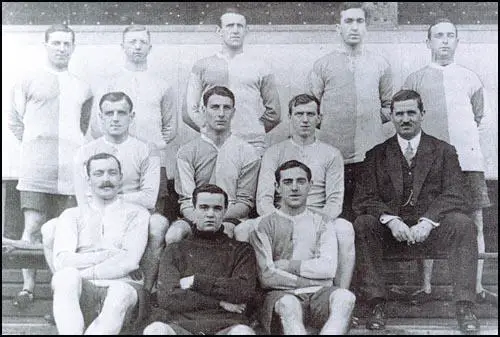
Edwin Latheron, George Chapman, Wattie Aitkenhead, Walter Anthony: Middle Row:
Albert Walmsley, Percy Smith, Billy Bradshaw, Robert Middleton, Front Row,
Bob Crompton, Alf Robinson and Arthur Cowell.
Blackburn Rovers started the 1912-13 season very well and were undefeated until December. This was followed by five successive defeats. In an attempt to regain the championship, Robert Middleton broke the British transfer record by buying Danny Shea from West Ham United for £2,000. Shea received £550 for signing for the club. Patsy Gallagher, described Shea as "one of the greatest ball artists who has ever played for England... his manipulation of the ball was bewildering."
Robert Middleton also purchased another forward, Joe Hodkinson for £1,000. Shea scored 12 goals but it was not enough and Blackburn finished 5th that season.
In the 1913-14 season Blackburn Rovers once again won the league title. Danny Shea was in great form scoring 27 goals. Other expensive transfers buys such as Jock Simpson and Joe Hodkinson also made substantial contributions to the success of the club and that year won places in the England team.
The following season Lawrence Cotton provided the money to enable Blackburn Rovers break the transfer record again when they bought Percy Dawson for £2,500 from Heart of Midlothian. Blackburn scored 83 goals in 1914-15 season. However, their defence was not as good and Blackburn finished 3rd behind the champions, Everton. Dawson was top scorer with 20 goals.
In 1920 virtually the entire top division of the Southern League was absorbed by the Football League to become that league's new Third Division. A year later this became the Third Division South.
Primary Sources
(1) William McGregor, letter (March, 1888)
Every year it is becoming more and more difficult for football clubs of any standing to meet their friendly engagements and even arrange friendly matches. The consequence is that at the last moment, through cup-tie interference, clubs are compelled to take on teams who will not attract the public.
I beg to tender the following suggestion as a means of getting over the difficulty: that ten or twelve of the most prominent clubs in England combine to arrange home-and-away fixtures each season, the said fixtures to be arranged at a friendly conference about the same time as the International Conference.
This combination might be known as the Association Football Union, and could be managed by representative from each club. Of course, this is in no way to interfere with the National Association; even the suggested matches might be played under cup-tie rules. However, this is a detail.
My object in writing to you at present is merely to draw your attention to the subject, and to suggest a friendly conference to discuss the matter more fully. I would take it as a favour if you would kindly think the matter over, and make whatever suggestions you deem necessary.
I am only writing to the following - Blackburn Rovers, Bolton Wanderers, Preston North End, West Bromwich Albion, and Aston Villa, and would like to hear what other clubs you would suggest.
I am, yours very truly, William McGregor (Aston Villa F.C.)
(2) J. A. H. Catton, The Story of Association Football (1926)
Several have done fine work for The Football League. Mr. William McGregor, the Father of the League, long ago entered into his rest, but his portrait is ever with us in the handbook of this organisation.
A Scotch lad, born at Braco, in Perthshire, he only saw rough, crude football, without rules, as a boy. When he took up his residence in Birmingham, he eventually became identified with Aston Villa.
He saw the difficulties clubs were placed in and the only way out of them. Above all things Mr. McGregor was practical, and from what he told me years after the League was a success, his one regret was he did not insist upon a territorial qualification for all the players. He said: "It's too late now."
But if he had taken that view, and his notion had been incorporated in the rules, I doubt whether such a regulation would have endured to this day.
When he was young the late Mr. J.J. Bentley accomplished much valuable work for this federation of clubs, and followed Mr. McGregor as President of the League. He was, moreover, one of the keenest and cutest judges of a player I ever knew. At heart he was a generous man.
His successor, Mr. John McKenna, has always appealed to the public as the personal embodiment of John Bull, as straight as a ramrod, as blunt and as frank as a man can be, and yet full of the milk of human kindness and of Irish humour. It is the universal opinion that, like Mr. Clegg, he is the right man for the Presidential chair. He had a helpful and loyal lieutenant in Mr. John Lewis.
Mr. John Lewis was very much of the same disposition as Mr. Clegg. I can pay him no higher compliment that I can conceive. Generally known as "the brains of the League," Mr. C.E. Sutcliffe, another Lancastrian, carries great weight in the chamber of the Management Committee and at the annual meetings of the League, for he has an inventive mind and finds a solution for nearly every football problem.
Such have been the leaders of the people's game. Is it any wonder that Association football is the people's pastime?
(3) Tony Matthews, Who's Who of Aston Villa (2004)
He (Devey) could play in any forward position and there is no doubt that he was one of the finest goalscorers in the country in the 1890s. A close dribbler with good pace (when required), Devey was alive to every movement on the field and possessed the rare gift of "intelligent anticipation". He never lacked initiative, but was a strong believer in combination, bringing in his fellow forwards and half-backs into the game as often as possible. He was exceptionally clever with his head as he was with both feet and often scored goals from distance when he caught the opposing goalkeeper off guard.

